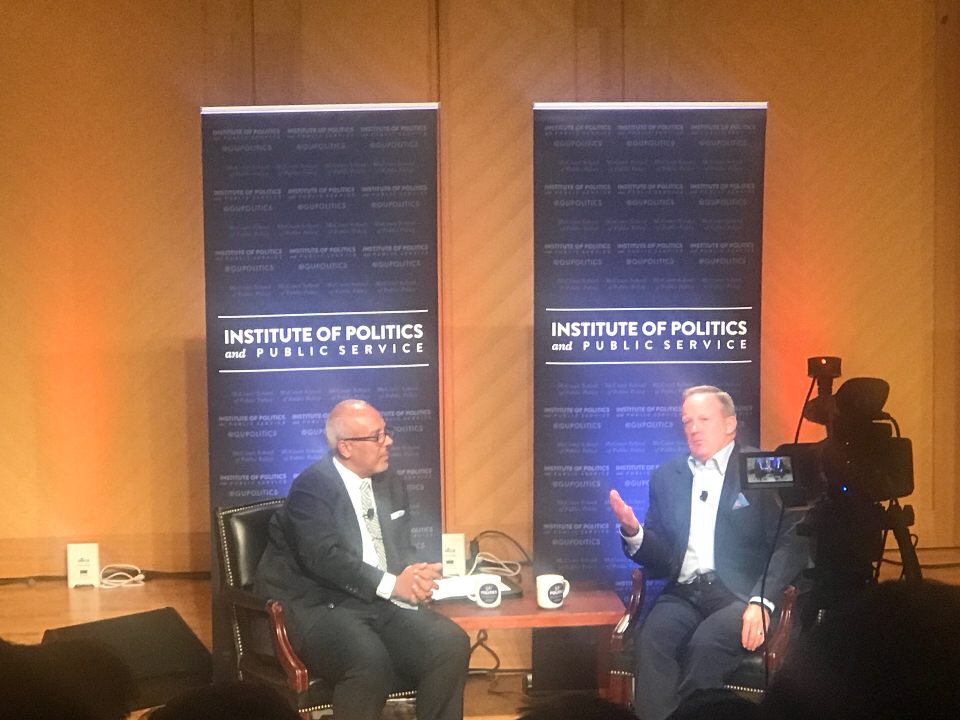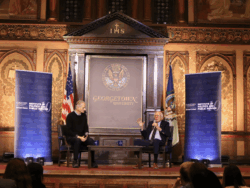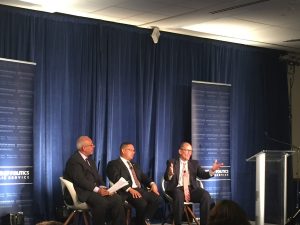Former White House Press Secretary Sean Spicer discussed his new book, The Briefing, in the Lohrfink Auditorium on Sept. 17. In a conversation moderated by Mo Elleithee (SFS ‘94), executive director of GU Politics, Spicer also touched on his experience in the Trump administration, the importance of the press in politics, and the importance of bipartisan conversation.
Hayley Grande (COL ‘21) introduced Spicer and detailed his activities since leaving the White House, which have included speaking engagements around the world, founding a strategic consulting firm, RigWil LLC, and serving as an adviser to the Super PAC America First.
Elleithee began the discussion by explaining that he and Spicer have known each other for many years, since Spicer was the RNC communications director at the same time that Elleithee was in the same position at the DNC.
Spicer said that during their respective tenures, he and Elleithee exemplified the ability of politically opposed people to listen to and respect different views. “I’m pretty convinced of where you stand,” he said. “And yet, we were always able to have the discussions and work together.”
When asked what drove him to work in communications, Spicer said that he loved the intensity of the work. “The thing that I love about press is that it was a daily battle,” he said.

Photo by Haley D’Alessio:Mo Elleithee (SFS ’94) and Sean Spicer
According to Spicer, there is a troubling trend in American society of shutting down contradictory opinions instead of trying to understand where those opinions originated from. “The idea that people can’t come and have a civil and respectful discussion is insane,” Spicer said.
Elleithee also asked Spicer if he thought that the press are the enemy of the people, noting that in the past President Trump has used this terminology. Spicer responded that there are both good and bad people in every industry, and that the press are no exception.
“I believe that the more and most effective strategy is to call out the bad and exalt the good,” Spicer said.
Spicer affirmed his support for a fair and free press, but said that he believed that there was a reluctance for the press to criticize their own and to correct false stories. “When a story comes out that is demonstrably false, no one from the Washington Post will ever criticize the New York Times…they refuse to do that,” Spicer said.
Elleithee disagreed with Spicer’s statement. “I see all the time where reporters will make a mistake and you’ll push back, effectively. And they will not only correct it, but you actually see reporters saying the New York Times got that wrong,” Elleithee said, citing a recent Nikki Haley story as an example.
“Is there a double standard by this president and those who support him, where they demand a level of honesty from the press that they themselves, that he himself is not willing to live up to?” Eillethee asked, to audience appluase.
Spicer responded that rather than correcting, the press “updates” stories. Additionally, the press criticize the president for making mistakes when they themselves take several days to revise false stories.
“Sean, I would be thrilled and I think a lot of people would thrilled if the president ‘updated’ his comments within two or three days, but he doesn’t,” Elleithee said. “[President Trump] has never ‘updated’ his claims that question Barack Obama’s birth place, the question of widespread voter fraud in the 2016 election, and, just this week, the death count in Puerto Rico.”
Another concern of Spicer’s was that many studies have shown there to be a clear media bias in favor of the left, citing Harvard and Pew.
Elleithee said that during his tenure as press secretary for Hillary Clinton’s presidential campaigns, there was plenty of scrutiny from the media.
“Anyone that worked for Hillary Clinton in either of her two presidential campaigns, if you think they felt like the press was on her side, you’d be sorely mistaken,” Elleithee said.
According to Spicer, all major institutions are controlled by the left which leaves out conservatives and their beliefs. In addition to media bias, Spicer said that conservatives have to deal with alienation in spaces like urban areas and college campuses. “We are dismissed and marginalized,” he said.
Elleithee responded that he felt similarly as a person of color growing up in a conservative community. But he also agreed with Spicer that isolating ourselves among like communities and creating echo chambers is a barrier to productive conversation across party lines.
Dalila Cuevas Rodriguez (SFS ‘21), who attended the event, said she valued the points Spicer made regarding the need for bipartisanship. “I feel like he really wants to have an open dialogue and encourage freedom of speech,” Rodriguez said. “Although we don’t agree politically, I feel like we agree on that point.”





